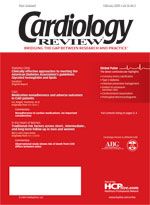Ultrafiltration in a 61-year-old man with decompensated heart failure
A 61-year-old man was admitted to the hospital for increasing shortness of breath, weight gain, and orthopnea.
A 61-year-old man was admitted to the hospital for increasing shortness of breath, weight gain, and orthopnea. He had a history of coronary artery disease, ischemic cardiomyopathy, and chronic renal insufficiency. He had been in his usual state of health until 1 month earlier, when he visited his cardiologist with symptoms of ankle edema and dyspnea on exertion after walking 1 block. He did not have any chest pain. At that time, his blood pressure was 108/64 mm Hg, and physical examination showed 2+ pretibial edema, 12 cm of jugular vein distension, and basilar rales.
An echocardiogram showed severe left ventricular dysfunction, with an ejection fraction of 25% and 1+ mitral regurgitation (no change from 1 year earlier). His electrocardiogram showed no ischemic changes, and his complete blood count and chemistry panels were normal, with the exception of a creatinine level of 1.5 mg/dL. His brain natriuretic peptide level was increased, at 750 pg/mL.
The patient’s medications included 25 mg of carvedilol (Coreg) twice daily, 20 mg of lisinopril (Prinivil, Zestril) daily, and 20 mg of furosemide (Lasix) twice daily. His furosemide dose was doubled to 40 mg twice daily and he was scheduled to return to the clinic 1 week later. At his next appointment, the patient had gained 3 pounds, and his shortness of breath was worse. His blood urea nitrogen (BUN) and creatinine levels had increased to 36 and 1.9 mg/dL, respectively. He was admitted for decompensated heart failure, diuretic resistance, and progressive azotemia.
In the hospital, his lisinopril and carvedilol were continued, and his furosemide was stopped. He underwent 2 ultrafiltration sessions over the first 2 hospital days, resulting in a 9-pound weight loss and resolution of his edema and shortness of breath. His potassium level was stable, and he required no replacement potassium. His BUN and creatinine levels decreased to 24 and 1.4 mg/dL, respectively.
The patient was discharged on the third hospital day with prescriptions for his usual outpatient medications, including 20 mg of furosemide twice daily (the same dose as before hospitalization). At his follow-up examination in the clinic 2 weeks later, the patient had lost another 2 pounds, was clinically euvolemic, and was back to his baseline functional status.
